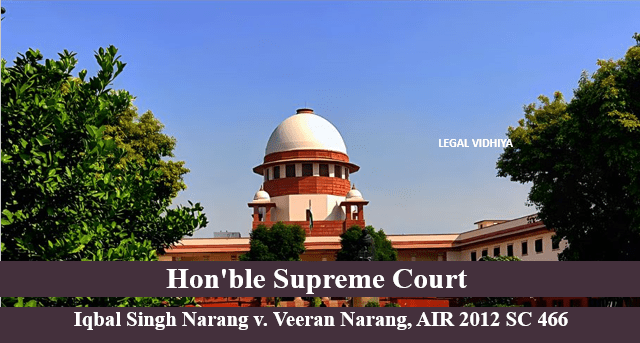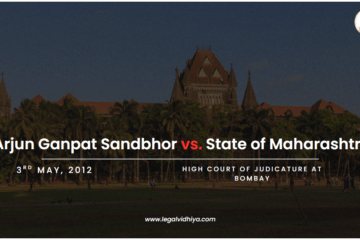
| Citation | AIR 2012 SC 466 |
| Date of Judgement | 30th November 2011 |
| Court | Supreme Court of India |
| Case Type | Criminal Appeal – No 2225 of 2011 (Arising out of SLP(Crl) No.5625 of 2007) |
| Appellant | Iqbal Singh Narang & Ors. |
| Respondent | Veeran Narang |
| Bench | Justice Altamas Kabir, Justice Surinder Singh Nijjar |
| Referred | 195(1) of CrPc, Sections 193, 420, 425, 120-B of IPC |
FACTS OF THE CASE
On August 3, 1998, According to Section 13 of the East Punjab Urban Rent Restriction Act, 1949, Appellant No. 1 submitted an ejectment application requesting that the Respondent be removed from a specific property. The Respondent filed a criminal complaint against the Appellants in response. The complaint was presented to the Illaqa Magistrate and documented as Crl. RBT Complaint No. 283/19.8.2003/2.8.2005. The Indian Penal Code (IPC) Sections 193, 420, and 120-B were used in the complaint with the claim that the appellants had made fraudulent declarations.
Before the Rent Controller-cum-J.M. First Class, Respondent additionally applied to Sections 193/420/425 IPC in addition to the criminal complaint. This request was made in connection with Rent Application No. 111 of 1998, which was started by Appellant No. 1. The Respondent claimed in this case that Appellant No. 1 had misled the Rent Controller throughout the current rent procedures. The Rent Controller decided on the application submitted by the Respondent on March 14, 2005, as according to him, the Respondent’s complaint under Sections 193, 420, and 425 of the IPC was still pending.
As a result, the Rent Controller concluded that there was no justification for taking any action against the Appellant based on the Respondent’s allegation. It’s significant to note that the Rent Controller’s order noted that the Respondent had not objected to this choice. The Appellants appealed to the Punjab & Haryana High Court. By Section 482 of the Code of Criminal Procedure, they filed Crl. Misc. No. 32515 of 2006. The complaint submitted by the Respondent under Sections 193/120-B IPC and the summons order dated April 24, 2006, were the subjects of this petition, which sought their quashing.
The High Court dismissed the appellants’ petition in the challenged judgement and decree. According to the High Court, the Rent Controller was not a “Court” as defined by Section 195(1) of the Code of Criminal Procedure. The High Court concluded that a private complaint (made by the Respondent) would be upholdable if misleading evidence was provided to or recorded before the Rent Controller. The High Court further pointed out that it was incorrect to think of the Rent Controller as a “Court” and that a previous ruling in Ram Krishan v. Santra Devi was per incuriam—erroneous because it disregarded pertinent legal precedent or case law.
Following this Judgement, the Indian Supreme Court received an appeal from the appellants.
ISSUE
When the Rent Controller was not regarded as a “Court” under Section 195(1) of the Code of Criminal Procedure, the main question before the Supreme Court was whether a private complaint regarding false statements made before the Rent Controller could still be maintained.
ARGUMENTS
The appellants argued that the respondent’s actions, including the filing of many applications before the Rent Controller, were a deliberate attempt to stall the legal proceedings. They claimed that these acts were pointless, vexatious, and intended to harm Appellant No. 1. The appellants asserted that the Rent Controller had specifically stated in a decision regarding the respondent’s application that the respondent’s complaint under Sections 193, 420, and 425 IPC had not yet been decided. They claimed that since the respondent had not contested the Rent Controller’s order, there was no basis for taking legal action against them based on the complaint that was submitted by the respondent as it had attained finality.
The appellants’ major demand was that the criminal complaint the respondent had filed under Sections 193, 420, and 120-B of the IPC be dismissed. They also attempted to have the Judicial Magistrate, First Class, Amritsar’s summoning order from April 24, 2006, quashed. They argued that the complaint could not be maintained because the Rent Controller did not meet the requirements of a “Court” under Section 195(1) of the Code of Criminal Procedure.
According to the respondent, the complaint they made against the appellants by Sections 193, 420, and 120-B IPC was legitimate. They argued that these accusations were valid since they thought the appellants had lied to the Rent Controller during the court proceedings. According to the respondent, the Rent Controller is not a “Court” as defined by Section 195(1) of the Code of Criminal Procedure. They argued that despite performing quasi-judicial duties, the Rent Controller lacked certain characteristics of a typical “Court” in the classic sense.
According to the respondent, a private person, such as themselves, had the right to submit a complaint over false representations made before the Rent Controller because the Rent Controller was not a “Court” as defined by the law. They emphasised that this case was exempt from the rule prohibiting the filing of such a complaint absent a formal complaint from the court or authorised court employees. The respondent contested the High Court’s ruling, claiming that it was grounded in already established legal precedents and free from any irregularities or violations of the law. They contended that the High Court’s decision regarding the position of the Rent Controller and the viability of private complaints accurately construed the law.
JUDGEMENT
According to the Supreme Court’s ruling, even if the Rent Controller performs quasi-judicial duties, it is not a “Court” for purposes of Section 195(1) of the Code of Criminal Procedure. Therefore, there is no justification for quashing the proceedings against the appellants, and private complaints against misleading statements made before the Rent Controller are maintainable.
The Court emphasised that statutory authorities, like the Rent Controller, are established for specific objectives and exercise their powers in a quasi-judicial manner by citing earlier rulings in situations that were comparable to this one. The Court made it clear that statutory authorities, such as the Rent Controller, do not possess inherent authority and may only exercise the powers granted to them by the applicable statute. The Court referred to the Rent Controller’s incapacity to consider a request for a delay pardon under Section 5 of the Limitation Act because the statute did not grant such authority. The Court ultimately determined that there was no justification for annulling the proceedings in which the appellants had been called under Section 193/420/120-B of the IPC.
The temporary orders issued previously were revoked after the Court dismissed the appeal.
REFERENCES
This Article is written by G Parinitha of St. Joseph’s College of Law, Intern at Legal Vidhya.



0 Comments